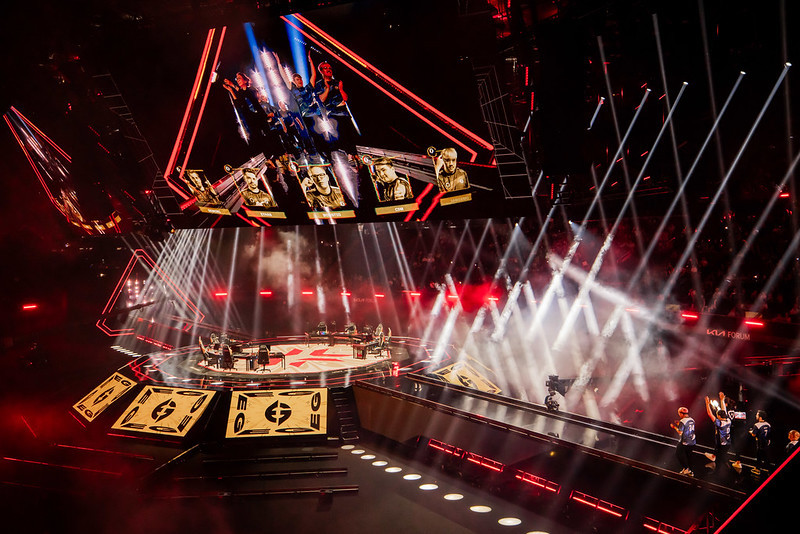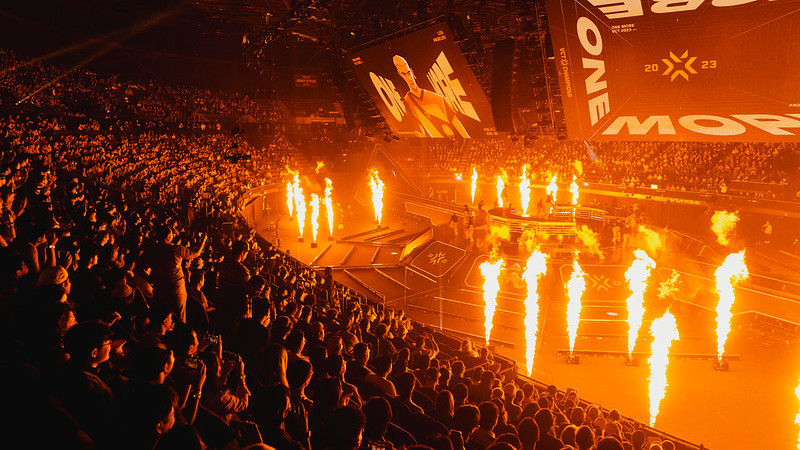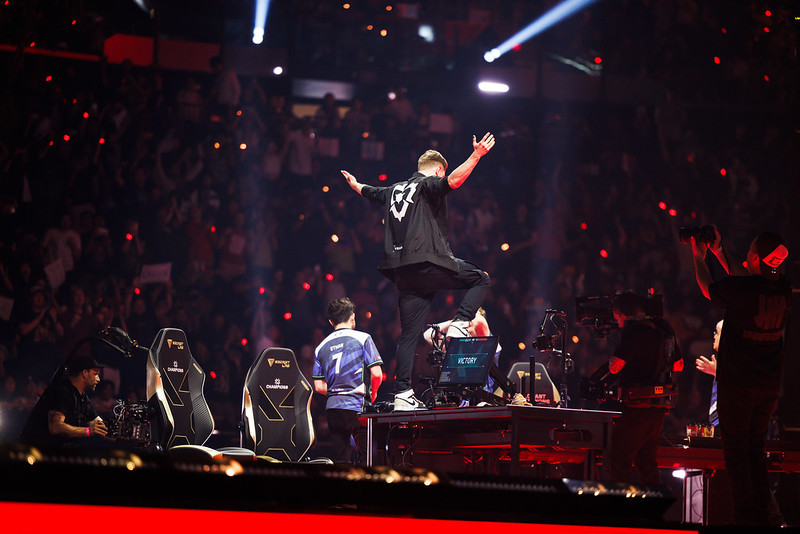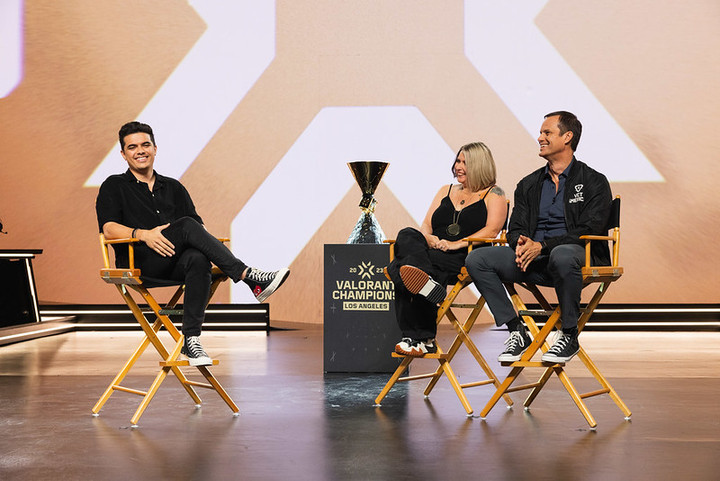Stepping into the KIA Forum for the first time, ready to watch the first of four high-stakes VALORANT matches, is a moment I’m in no hurry to forget. Impeccably themed, bathed in red, and on a stage that had been plucked from the future. The VCT Champions 2023 felt like a huge milestone for Riot Games, taking place on the studio’s home turf in Los Angeles. The best VALORANT teams around took to the grand stage in the hopes of being the squad that walked away with the trophy: Paper Rex, Evil Geniuses, LOUD, and FNATIC. Regardless of outcome, for Riot Games this was a special moment.
Leo Faria, Riot Games’ Global Head of VALORANT Esports, knew this — watching the result of the entire crew’s hard work now playing out in real time, despite spending the days prior tackling questions from fans, players, and media alike regarding the hotly-debated VCT format. It was during the Lower Bracket Final, where Evil Geniuses took on LOUD to secure their place in the Grand Finals, that we had the chance to speak with Faria. With the excitement of the crowd rumbling overhead, down in the press room we asked how it felt to build out this year’s VCT, how Riot has handled the passionate feedback from the community, and the state of the game’s competitive scene.
GINX: We’re seeing some of the best of the best on the world stage right here in Los Angeles, the home of Riot Games. How does that feel?
Faria: Oh, it feels so good. It feels incredible. You know, '23 has been a special year for us because it's the first year where we’re really seeing all of VCT, we launched these three new international leagues and launched a new system and partnership with the teams.
And being able to end the year and conclude the season at home with the house party, seeing all of Riot here activating, you know, building on top of the show — it's been really special. It's also our first champions in the America's. Been a lot in EMEA for the past couple of years, for a number of reasons, including pandemic and covid. This year we've been to Brazil to Tokyo. But now, finally being here in North America, where we probably have one of our biggest, most passionate communities around the world. It's been great. I mean the vibes are awesome.
The crew producing the show, they're like “I can't believe I'm sleeping in my own bed,” because they travel so much for these shows around the world. So it's been really cool for all of us.

GINX: What’s been a personal highlight for you so far from this Championships?
Faria: So at the start of the year we decided to reorientate on the visual identity of our shows, right? So if you look at our shows up until Champions, just simple. Until Game Changers in Berlin last year, they had a very distinct look. Going into this year we built what we called the Battle Arena. It’s the 12-sided stage we debuted at Lock-In. And we've been iterating and growing that.
This, right here, is the ultimate manifestation of that Battle Arena. So when I walked here for the first time, we had just finished building and putting together, loading in all the major pieces. It was really special, like I was stunned. I was trying hard not to cry because if it felt so special we put so much work into it and we care so much about everything, all the little details; how the stage is lit, the straight lines that make it feel very much like VALORANT, and how the desks are facing each other so we create tension between pros. Seeing it in all of its, you know, magnitude and beauty — it was awesome. And even more awesome being here on day one, seeing fans walk in, pull their phones out and take a photo and you know, people freaking out. That's why we do what we do. It felt incredible.
GINX: I did the same thing, up in the stands like “this is amazing.” I've not seen an arena like it and it does take your breath away.
Faria: That’s really cool to hear.

GINX: We've seen some pros comment on the various changes that VALORANT has undergone with the VCT format. How do you handle the feedback?
Faria: So, it's challenging. When we hear feedback from pros, what we have to take into consideration is our community is so diverse. If you think about Riot as a game developer and publisher, it's a very direct relationship with players.
It's Riot — we develop the game, we publish the game, our players play it. If you look at esports, we have so many different partners. We have pros, we have teams, we have sponsors, we have tournament organizers, we have players’ associations. And each one of those parties they're looking at their world, their interests. They're looking at their lives and their careers.
So, usually those complaints make a lot of sense from their perspective, right? Of course a team owner who wants to be on tier one of the VCT, they're not going to be a fan of the partnership system, right? Of course, the player who is qualifying for every global event and playing everything they'll be like “oh, I'm so tired. There's so much to play.”
We were the League of Legends company for 10 years, right? And being able to do it again with another competitive game that has been resonating so much with fans, all around the world. It feels special.
A player who’s not qualifying for global events will look at the calendar and say, “Oh, there's not enough for me to play,” and from their perspective, all of those things make sense. But we have a responsibility to look at every perspective and make a decision that's better for the sport. And the reality is, what's better for the sport is never going to be perfect for everyone.
So, y’know, it's part of the job. At the end of the day whenever conversation gets heated I always remind myself that people only complain about what they care about, right? They are complaining because they love VALORANT, because they want to be part of it. Otherwise people would just go do something else.
And there are so many amazing games and things they can do, you know, like in 2023 as far as entertainment choices. We’re always just super grateful that they choose VALORANT, and we’ll always be listening. We're always going to try and experiment, and if things don't work I have no problem like, Riot has no problems admitting a mistake and saying, “Yep, we tried something. It didn’t work. We're going to try something else.”
GINX: Based on what you've said, we’re seeing VALORANT esports go from strength to strength, with more and more people engaging with it. Has that surprised you in any way?
Faria: I'll be honest, It's been surprising. We were the League of Legends company for 10 years, right? And being able to do it again with another competitive game that has been resonating so much with fans, all around the world. It feels special. We look at Japan for example: we were confident that VALORANT would resonate with players in the America's and you know, North America and Europe, but Japan was such a surprise for us. Because FPS, in general, it's not a popular genre [in Japan]. It's a market that is console dominated and seeing how VALORANT exploded in Japan has been such a huge surprise.
When we launched this game back in 2020, we didn't even know if players would show up. We hoped the sport would be possible, but we launched in the middle of a pandemic so we couldn't do live events. Above all seeing it all growing very organically, right? VALORANT was not a game that exploded from day one. It was like constant growth and we're seeing more players, more fans and viewership in the field of competition. It feels incredible. And yeah, like it is very much a surprise for us.
I think what makes VALORANT special is the fact that it is a tactical shooter, right? Where above all, gun play matters. You walk into a map, you get shot in the head, you’re dead, you're done for the round. But when you layer abilities, you're really raising the skill ceiling
GINX: Do you think VALORANT benefitted from launching during the pandemic?
Faria: Absolutely. Yeah. Everyone trapped at home, looking for ways to entertain themselves. From a game perspective, it was absolutely like a blessing and a curse, right? In a lot of ways. It was definitely a bit more difficult for the sport of it all, because how do you do it? We launched the Ignition series back in 2020 with regional competitions around the world. All of them were online. It really stretched us to learn remote production. How do we produce a show fully remote?
In fact, that has informed a lot of our plans for the future. We built and launched last year what we call the RPC, a remote production centre in Dublin. We're now building a new one in Seattle, where we're now producing shows from any part of the world from those centres, and that was a product of the pandemic.

GINX: During the Media Day on Wednesday (Aug. 23, 2023), it was brought up that a lot of teams, Evil Geniuses for example, amassed their team with pro players who initially specialized in other games. Overwatch, CS:GO, and such. Has there been anything that surprised you from players like that? And have you seen any tactics that have been taken from these other games and have perhaps been evolved in VALORANT?
Faria: That's an interesting question. I think what makes VALORANT special is the fact that it is a tactical shooter, right? Where above all, gun play matters. You walk into a map, you get shot in the head, you’re dead, you're done for the round. But when you layer abilities, you're really raising the skill ceiling. Now, there are so many more ways to play the game and to build a strategy that's not just holding an angle and shooting someone in the head. And I think that combination makes VALORANT the special game that it is. Because if you look at our peers in the industry, they're usually choosing a side. They’re either fully tactical shooters. No abilities. Very few utilities, but like, very focused on gunplay, or they’re full-on action shooters, which is you’re running around and shooting, and precision is not as important, because it’s movement that matters.
I think VALORANT found this sweet spot in the middle, where players who come from all of these games can use their experience to build on and apply that to VALORANT. And it's been really cool. We even saw players like Sassi (Santeri "BONECOLD" Sassi) who used to be a League of Legend pro, but always loved FPS, and found in VALORANT a way to have abilities on top of gunplay, and has been incredibly successful. So, I mean, it's been really cool and that is a part that's been really surprising, because we see pros doing things with the game that we’re like, “what the hell? No-one saw this coming.”
This year's VCT Championships had an explosive finish, with Evil Geniuses returning to take on Paper Rex one more time in the Grand Final in a best of five. The showdown didn't make it to the full five games, however, as Evil Geniuses walked away with a 3-1 victory, and their first major trophy.

 No ads, our video library,
No ads, our video library,

